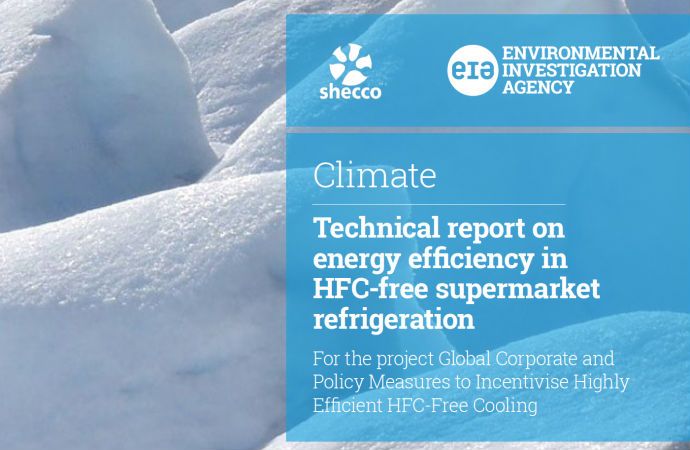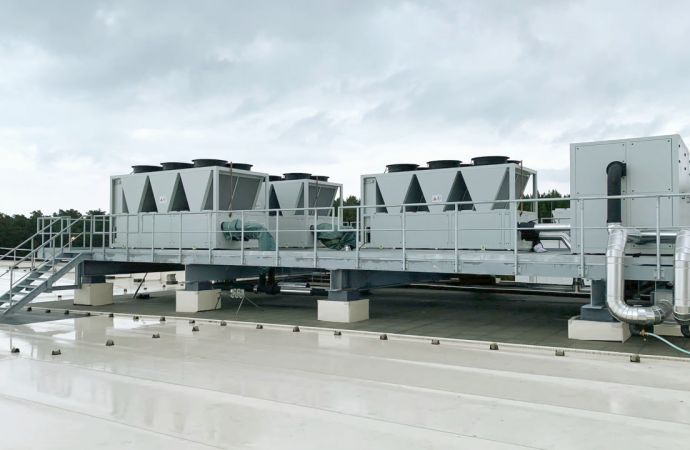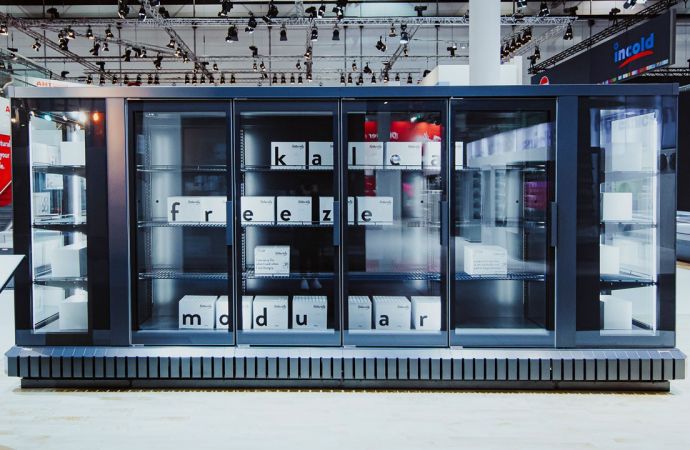CO2 condensing units boost efficiency up to 27%, R290 units up to 30%, according to case studies in new EIA/shecco study, unveiled at ATMOshere Europe 2018.

Supermarket refrigeration systems using CO2 or propane (R290) were found to be more efficient than their HFC counterparts, according to a new report published by the Environmental Investigation Agency (EIA) and shecco, publisher of this website.
The report “ Technical report on energy efficiency in HFC-free supermarket refrigeration ” was released this week at ATMOsphere Europe 2018 , in Lago di Garda, Italy, where a session presented the main highlights of the report.
The EIA/shecco initiative was funded by the Kigali Cooling Efficiency Program (KCEP) to support the consideration of energy efficiency requirements by members of the Consumer Goods Forum (CGF) as they roll out HFC-free commercial refrigeration.
“The report itself aims to serve as an information source for end users looking for energy efficient HFC-free alternatives,” said Klára Zolcer Skačanová, Market Development Manager, shecco.
The report itself aims to serve as an information source for end users looking for energy efficient HFC-free alternatives.”
– Klára Zolcer Skačanová, Market Development Manager, shecco
According to the report, various energy-efficient HFC-free commercial refrigeration options currently exist for different sizes of supermarkets:
- Centralised systems utilising any form of CO2 technology can achieve significant energy savings compared to traditional HFC technologies. The level of energy savings depends on the climatic conditions and the design of the system. The addition of technologies such as parallel compression, ejectors, mechanical sub-cooling, and adiabatic/ evaporative cooling allows CO2 systems to reach better energy performance than HFCs in high ambient climates.
- HFC-free options for condensing units exist with CO2 and to a lesser extent with hydrocarbons. According to case studies presented in this report, CO2 condensing units have reached up to 27% higher energy efficiency compared to their HFC counterparts.
- The case studies showed that R290 units have delivered up to 30% higher energy efficiency. In addition, most manufacturers said higher energy efficiency is guaranteed from R290 plug-ins compared to their HFC counterparts. Most stated energy efficiency gains between 20%-30%, while a few indicated their R290 systems can be up to 40% more energy efficient than HFC plug-ins. ALso, innovative waterloop solutions, designed to move the heat generated from the plug-in units to outside the store, have been developed and are being installed in the market, with companies reporting energy savings of up to 35%. However, outdated refrigerant charge restrictions for hydrocarbons still pose a barrier for a wider uptake of this type of condensing unit in the market.
Switching refrigeration systems away from HFCs offers an ideal opportunity for supermarkets to simultaneously improve their energy efficiency. Through careful planning and assessment of future-proof decisions, supermarkets can now be designed and installed with both the climate and the bottom line in mind.
“Food retailers should use the opportunity of the HFC phase-down to simultaneously improve the energy efficiency and sustainability of their refrigeration systems,” said Clare Perry, Climate Campaign Leader, EIA.
Food retailers should use the opportunity of the HFC phase-down to simultaneously improve the energy efficiency and sustainability of their refrigeration systems.”
– Clare Perry, Climate Campaign Leader, EIA
Food retailers will be key players in ensuring market demand for energy efficient HFC-free technology, encouraging development of new technology and system controls, providing and sharing case studies and success stories and maintaining pressure on the manufacturing industry and policymakers to ensure the success of the HFC phasedown.
Decisions concerning refrigeration systems must take into account the total life cycle cost (not just the initial upfront cost) and the full environmental impact. Making the right choice of refrigerant and system now will avoid serious headaches for retailers down the line.
Related stories



